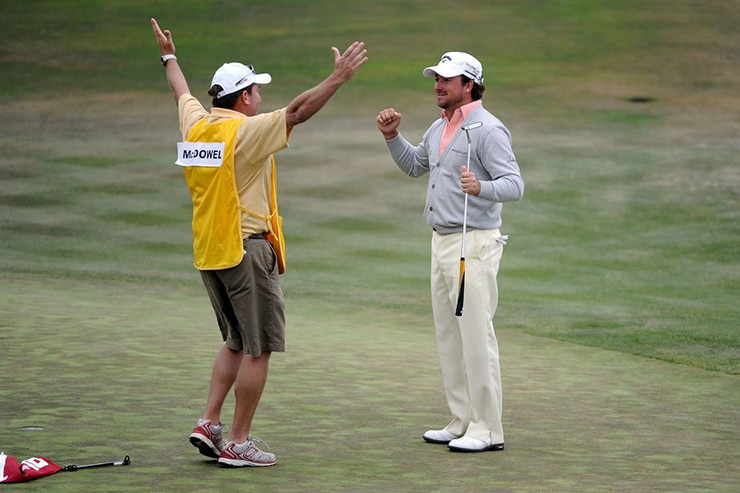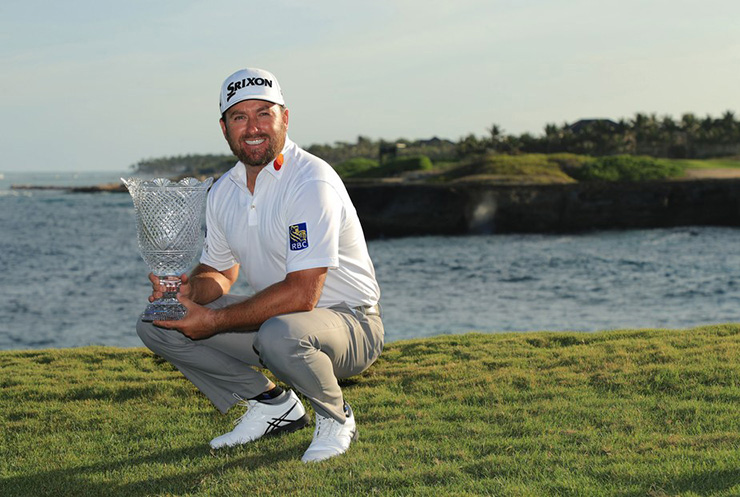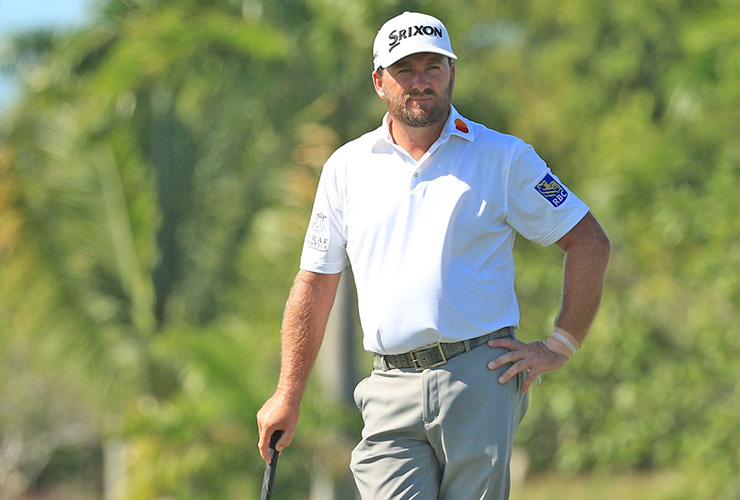By John Feinstein
Graeme McDowell has never been one to rationalize poor play—especially his own. That’s why it wasn’t surprising on Sunday after his victory in the Corales Puntacana Resort & Club Championship, that one of his first comments was, “It’s been a rough few years.”
Maybe it’s because of their country’s troubled history, but those who come from Northern Ireland and play golf, seem to have little problem telling the truth, whether it’s David Feherty, Darren Clarke, Rory McIlroy or McDowell.
“When you’ve been in a bar that blows up about 15 minutes after you evacuate, saying you had a lousy day at the golf course isn’t too difficult,” Clarke once said. “When I’m bad, I know I’m bad so why should I try to pretend it wasn’t so?”
Which is why McDowell had little difficulty Sunday in noting that his first victory since the fall of 2015 was a long time coming—and that there was plenty of bad golf in between.
In 2010, McDowell finished the year ranked sixth in the Official World Golf Rankings, but there was no doubting that he was the player of the year. He won the U.S. Open at Pebble Beach and had four official wins worldwide. He also scored the clinching point for Europe at the Ryder Cup that September and, in an otherwise meaningless exhibition, he made two long putts on Sunday—one to get into a playoff, the other to win the playoff—and beat Tiger Woods in the season-ending tournament he hosts. (If the opponent had been anyone but Woods, the exhibition victory would have been little noticed nor long remembered. But it was Woods. And so, it capped a remarkable year.)

McDowell celebrates with his caddie, Ken Comboy, after making par on the 18th hole to win the 2010 U.S. Open at Pebble Beach. (Harry How/Getty Images)
At 31, McDowell was both a star and a celebrity. There was a documentary (slash infomercial) produced about him called, “Being Graeme McDowell.” He was on “The Tonight Show.” He even had a cameo on an episode of the HBO series, “Entourage.”
McDowell continued to win and contend often for the next four years. He finished T-2 at the 2012 U.S. Open at the Olympic Club and was T-5 a month later at the Open Championship. In fact, his worst finish in a major in 2012 was a T-12 at the Masters.
It was during that year that McDowell built a home at Lake Nona in Orlando and hired Kristin Stape as his interior designer. They started dating soon after and were married a year later. Two children came along not long after that. Then came a restaurant—Nona Blue—along with all the various endorsements that had been signed in the wake of McDowell’s breakout year in 2010.
There was a lot going on in his life, on and off the golf course. The work ethic that had helped make him a star took a hit, not so much because McDowell didn’t have the desire anymore but because he often didn’t have the time.
He won at Harbour Town in 2013—beating Webb Simpson in a playoff nine months after Simpson had beaten him at Olympic—and won again in France a year later.
In the fall of 2014, he went 3-0 for Europe in the Ryder Cup matches at Gleneagles. He partnered Ryder Cup rookie Victor Dubuisson to easy victories on Friday and Saturday and then beat Jordan Spieth, 2 and 1, in the opening singles match on Sunday.
And then came the slide—broken only by a win at Mayakoba late in 2015. He failed to make the Ryder Cup team in 2016 even though Clarke, Europe’s captain that year, wanted very much to have him on a team that had six rookies.
“He just wasn’t playing well enough to justify it,” Clarke said that year. “I would have loved to have had his experience and to have him in the team room, but I just couldn’t do it.”
A year later, in 25 starts in the U.S. and Europe, McDowell didn’t have a single top-ten finish. He had two last year—one in Europe and one in the U.S.—but arrived at Corales Puntacana last week ranked 257th in the world, having finished 160th in the FedEx Cup standings a year ago. His only exempt status was as a past champion.
He had shown some signs of life earlier in the 2018-’19 season, finishing T-11 at the RSM Classic in November and T-18 at Pebble Beach, where he returned to the scene of his greatest victory.

McDowell poses with the trophy after capping his fourth PGA Tour win of his career on Sunday in the Dominican. (Mike Ehrmann)
After opening with a 73 on Thursday in the Dominican, the magic came back. McDowell shot back-to-back 64s to take the lead into Sunday and then hung on, making a clutch birdie at the 17th hole that allowed him the luxury of cosying a par putt to within a few inches on 18, knowing the tap-in bogey would give him the win. He shot 69 to finish a shot in front of Chris Stroud and fast-finishing McKenzie Hughes (66 on Sunday).
Like almost everyone in the field, McDowell was at Corales Puntacana searching for something that would either start or re-start a career. While the game’s stars were playing in the WGC-Dell Match Play in Texas for a purse of more than $10 million, the wanna-be future and former stars were in the Dominican Republic teeing it for a relatively paltry $3 million.
Because the tournament is an “opposite” event on the PGA Tour (being played the same week as a WGC event), the Masters doesn’t give the winner a spot in the tournament. But the win does grant a player fully exempt status on tour for two years which, at this point in McDowell’s career, is a big deal. He no longer has to rely on the kindness of tournament directors or his past champion’s status to get into fields.
He talked hopefully after his victory about this being a start towards returning to the top 100 or top 50 in the world—hardly unreasonable goals. The victory jumped him to 133 in Monday’s OWGR and clearly had great meaning for him.
“This is for all the people who stood by me,” he said, referencing his family—wife and three children—and close friends.
McDowell will be 40 in July. Plenty of players—see Woods, Tiger—have proven you can have a second act in golf in your 40s.
Golf’s better when the guy known to one and all as G-Mac, is playing well. He’s bright and funny and thoughtful and has that Northern Irish “truth gene.”
Three years ago, McDowell sat in a Hilton Head restaurant, six months removed from his victory at Mayakoba and talked about that year’s Ryder Cup. He wasn’t fooled by one good weekend in Mexico.
“I’m going to have to start playing better to make the team,” he said. “I know if I give Darren any excuse to pick me, he’ll pick me. Problem is, my game isn’t where I can give him an excuse. I’m searching. I hope I’ll find something soon, but I’m still searching.”
McDowell would be the first to tell you the search didn’t end Sunday in the Dominican Republic. But clearly, he found something.
It’s is difficult to believe it has been almost nine years since his win at Pebble Beach. The U.S. Open returns there in three months. McDowell will be there, not just as a past champion, but as someone who will arrive believing he has a chance to compete.
He proved that this past weekend—not just to people in golf, but perhaps most importantly, to himself.









